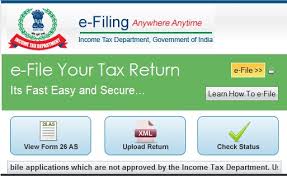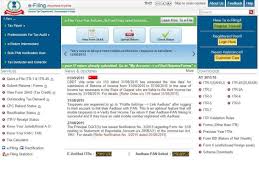 The government today notified a simpler, one-page form for filing income tax returns while making it mandatory to quote Aadhaar number and disclose bank deposits of more than Rs 2 lakh post demonetisation.
The government today notified a simpler, one-page form for filing income tax returns while making it mandatory to quote Aadhaar number and disclose bank deposits of more than Rs 2 lakh post demonetisation.
The Income Tax Return Form-1 (Sahaj) will replace the 7-page form, removing a plethora of columns on deductions from income claimed.
Sahaj can be filed by an individual having income of up to Rs 50 lakh from salary, house property and interest.
Currently, SAHAJ (ITR 1) is filed by salaried employees and ITR 2 by individuals and HUFs whose income does not include income from business.
The government has done away with form ITR 2A (used by individuals & HUFs not having income from business or profession and capital gains and by those who do not hold foreign assets).
Sahaj makes quoting of 12-digit biometric identifier Aadhaar number mandatory along with Permanent Account Number (PAN) and also seeks details of cash in excess of Rs 2 lakh that was deposited in bank accounts in the 50-day post demonetisation window.
ITR 2 and ITR 3 have a Schedule AL requiring assessees to declare their assets and liabilities at the end of the fiscal.
Only 6 crore out of 29 crore persons having PAN file income tax returns at present.
The e-filing facility for ITR-1 is enabled from April 1 and ITRs can be filed till the stipulated deadline of July 31.
While the old ITR form too had column to quote Aadhaar, the government has through an amendment to the Income Tax Act this week made quoting it mandatory.
“The Central Board of Direct Taxes has notified Income- tax Return Forms (ITR Forms) for the Assessment Year 2017-18. One of the major reforms made in the notified ITR Forms is the designing of a one page simplified ITR Form-1 (Sahaj),” CBDT said in a statement.
In the new form, parts relating to tax computation and deductions have been rationalised and simplified for easy compliance.
Besides personal details, an income tax filer needs to disclose only his income from salary or pension, one house property and other sources like interest. Thereafter, deduction claims are to be stated, followed by computation of taxable income.
Bank details are to be filled in the column following that. Details of advance tax, self-assessment tax payments and tax deducted at source come next.
In the column for providing bank details, cash deposited in excess of Rs 2 lakh during November 9 to December 30, 2016 has to be mentioned.
The rationalised ITR will “reduce the compliance burden to a significant extent on the individual tax payer,” the CBDT said, adding that the move would benefit more than two crore tax-payers who will be eligible to file their return of income in this simplified Form.
Instead of 20 columns of deductions in the old form, only four deductions claims in respect of Section 80C, 80D, 80G and 80TTA need to be filled.
“Simultaneously, the number of ITR Forms have been reduced from the existing nine to seven forms. The existing ITR Forms ITR-2, ITR-2A and ITR-3 have been rationalised and a single ITR-2 has been notified in place of these three forms,” it said.
Consequently, ITR-4 and ITR-4S (Sugam) have been renumbered as ITR-3 and ITR-4 (Sugam) respectively.
There will be no change in the manner of filing of ITR Forms and all the returns are to be filed electronically.
However, where return is furnished in ITR-1 (Sahaj) or ITR-4 (Sugam), an individual of the age of 80 years or more, an individual or HUF whose income does not exceed Rs 5 lakh and who has not claimed any refund in the return of income, have an option to file return in paper form.
At the time of filing the form, the taxpayer has to fill in PAN, Aadhaar number, personal information and information on taxes paid. TDS will be auto-filled in the form.
Post July 1, as per amendments to the Finance Bill 2017 as passed by the Lok Sabha, it would become mandatory for an assessee to provide the Aadhaar number or the number showing that he has applied for Aadhaar in the ITR.
Also ITR 4 (filed by Individuals & HUFs having income from a proprietary business or profession) will now be known as ‘Sugam’ and ITR-4S will be substituted.
“Going forward for AY 2017-18, the benefit of using the simplest ITR form i.e. ITR-Sahaj shall not be available to the following category of taxpayers: those earning total income of more than Rs 50 Lakh, those earning dividend income of more than Rs 10 lakh and those whose total income includes cash credits, unexplained investments, unexplained money etc,” said Nangia & Co Partner Suraj Nangia.
Similarly, ITR 4 (Sugam) cannot be used by the following category of taxpayers — those earning dividend income of more than Rs 10 lakh, those whose total income includes cash credits, unexplained investments, unexplained money etc.
“Owing to the aforesaid changes, taxpayers earning income for these sources will have to file a more detailed form containing disclosure in respect of their assets and liabilities, bank accounts etc,” Nangia said.





